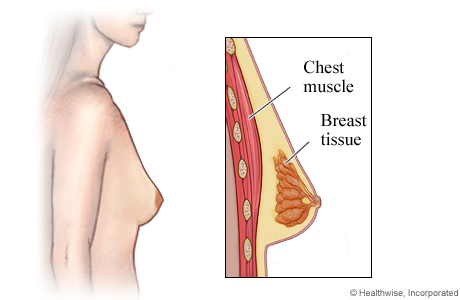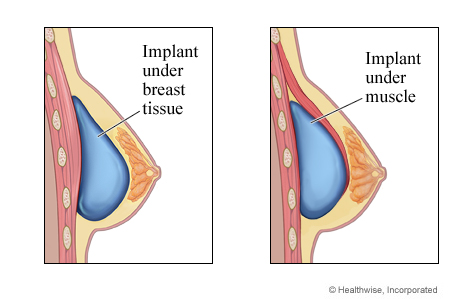Our Health Library information does not replace the advice of a doctor. Please be advised that this information is made available to assist our patients to learn more about their health. Our providers may not see and/or treat all topics found herein.
Topic Contents
Breast Enlargement
Surgery Overview
In breast enlargement surgery, the doctor makes the breasts larger by putting an implant under the breast tissue and often under the chest muscle. An implant is a soft silicone shell filled with a saltwater solution or a gel.
Your doctor will make a cut, called an incision. Then the doctor will put in the implant and adjust it to the correct shape, size, and position. Then the incision is closed.
You may have a breast lift at the same time as the breast enlargement. A breast lift is also called mastopexy. It can raise sagging or drooping breasts. It can also pull up the nipple and the area around it.
You will probably be asleep during surgery. You may be able to go home the same day. Depending on the type of work you do, you should be able to go back to work or your normal routine in 1 to 2 weeks. The incisions leave scars. But the scars will fade with time. Your doctor will try to make the incisions in line with the curve of your breast as much as possible.
Your new breasts may feel firmer and look rounder. It is very important to understand that your breasts will look and feel different after surgery. You will have scars where the doctor made the incisions in your skin. The skin on your breasts may be numb. This usually gets better with time. But you may always have some loss of feeling in the nipple area.
Most breast implants don't last a lifetime. Over time, you may need surgery to remove or replace your implants.
How It Is Done


In breast enlargement surgery, the doctor makes the breasts larger by putting an implant under the breast tissue or under the chest muscle. An implant is a soft silicone shell filled with silicone gel or a saline (saltwater) solution.
What To Expect
After the surgery you will probably feel weak. You may feel sore for 2 to 3 weeks, and you'll likely have a lot of swelling. You may have a pulling or stretching feeling in your breast area. You can expect to feel better and stronger each day, although you may need pain medicine for a week or two. You may get tired easily or have less energy than usual. This may last for several weeks after surgery.
You may be able to go home the same day. Depending on the type of work you do, you should be able to go back to work or your normal routine in 1 to 2 weeks. Most stitches are removed in 5 to 10 days. The incisions leave scars that will fade with time. Your doctor will make as many of the incisions as possible in line with the curve of your breast.
Breast cancer screening
The breast cancer screening guidelines are the same if you have breast implants. But having implants can make it harder for small cancers to be seen on a mammogram. And they can make it hard to see all of the breast tissue.
Be sure to tell the person who schedules your mammogram that you have implants. The technician will need to know what type of implants you have (saline or silicone) and whether they are behind or in front of the chest muscle. The technician may need to take more views than during a typical screening. In some cases, MRI scans may be needed to get a clear image.
Why It Is Done
This surgery is done to make the breasts bigger and to enhance their shape. You may decide to get breast implants:
- If you think your breasts are too small. What is "too small" (or too large) is a personal opinion. If you are happy with the size of your breasts, they are not too small.
- To restore the size or shape of the breasts after pregnancy or losing a lot of weight.
- To make the breasts match better. In many women, one breast may be larger or sit higher than the other breast.
How Well It Works
Breast enlargement surgery can increase your breast size by one or more bra cup sizes. It can also help your breasts match better in size and shape.
Most people who get breast implants are satisfied with the results. You are likely to be happy with the results if you are realistic about what you expect from the surgery. The surgeon can show you pictures of other people who got implants. This can give you a good idea about what to expect.
Risks
Breast implants may make it harder for a mammogram to detect breast cancer.
Other risks include:
- Capsular contracture. This occurs when scar tissue around the implant hardens and starts to squeeze the implant. Surgery may be needed to remove the scar tissue or replace the implant.
- Loss of feeling in the nipples or breast. Often this doesn't last very long, but sometimes it's permanent.
- An unwanted change in the size or shape of the breasts after surgery.
- Changes in the implant. Over time, the implant may harden, develop ripples, or change shape or position. If this happens, you may need surgery to remove the implant.
Less common risks include infection, blood under the skin (hematoma), and abnormal scarring.
There is also a small risk of getting breast-implant-associated anaplastic large cell lymphoma (BIA-ALCL). This is a serious cancer that develops near the implant and can lead to death. The risk of getting this cancer seems to be higher for breast implants with a textured surface than for implants with a smooth surface.
The risk of problems after the surgery is higher if you have more than one surgery at the same time, such as a breast lift and breast enlargement.
Credits
Current as of: October 1, 2024
Author: Ignite Healthwise, LLC Staff
Clinical Review Board
All Ignite Healthwise, LLC education is reviewed by a team that includes physicians, nurses, advanced practitioners, registered dieticians, and other healthcare professionals.
Current as of: October 1, 2024
Author: Ignite Healthwise, LLC Staff
Clinical Review Board
All Ignite Healthwise, LLC education is reviewed by a team that includes physicians, nurses, advanced practitioners, registered dieticians, and other healthcare professionals.
This information does not replace the advice of a doctor. Ignite Healthwise, LLC disclaims any warranty or liability for your use of this information. Your use of this information means that you agree to the Terms of Use and Privacy Policy. Learn how we develop our content.
To learn more about Ignite Healthwise, LLC, visit webmdignite.com.
© 2024-2025 Ignite Healthwise, LLC.




